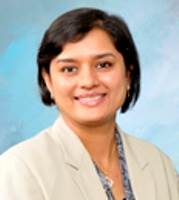
The research of a Wayne State University School of Medicine fellow was chosen for the Society for Reproductive Investigation's Pfizer-SRI President's Award and will be recognized at the society's annual scientific meeting March 16-19 in Montreal.
Mili Thakur, M.D., a third-year fellow in the Department of Obstetrics and Gynecology, and Center for Molecular Medicine and Genetics' combined Medical Genetics and Reproductive Endocrinology and Infertility Fellowship program, will be recognized at a private luncheon March 18 for the abstract, "Galactose and Its Metabolites Deteriorate Metaphase II Mouse Oocyte Quality through a Mechanism that Involves the Generation of Reactive Oxidative Species, Mitochondrial Dysfunction and Apoptosis."
Her mentor, Associate Professor of Obstetrics and Gynecology and of Biochemistry and Molecular Biology Husam Abu-Soud, Ph.D., and colleague Faten Shaeib, Ph.D., will accept the award and present the work on her behalf.
The Pfizer-SRI President's Presenter's Award was established in 1996 as the Wyeth President's Presenter Award to recognize the 25 most meritorious abstracts (either poster or oral presentation) submitted by individuals still in training. Dr. Thakur has been a fellow in Dr. Abu-Soud's lab for two years.
"It is an honor to have my research recognized by the Society of Reproductive Investigation. This award and the presentation next month will provide a great platform to highlight and educate the health care providers about this rare genetic disease and the challenges faced by the patients," she said.
Classic galactosemia is a genetic disorder affecting how the body processes galactose, a simple sugar in dairy products, breast milk and many baby formulas.
"If galactose is not withdrawn from the diet of the affected infants in time, they suffer from a range of acute complications and die," Dr. Thakur said.
Consequently, all states include the metabolic disorder in their newborn screening program. Treatment with immediate lifelong galactose restriction can reverse or prevent the acute complications, but many well-treated patients continue to develop long-term debilitating complications like mild cognitive impairment, growth restriction, premature ovarian insufficiency and other neurological deficits. A majority of females with the disorder - more than half of those being followed at the Children's Hospital of Michigan Metabolic Clinic for example - develop reproductive problems caused by an early loss of ovary function, called premature ovarian insufficiency, she said.
"The cause and treatment of these complications is now the single biggest issue in this field," she said.
Her research focuses on understanding the mechanisms of premature ovarian insufficiency in women with classic galactosemia by studying the effects of galactose and its metabolites on oocyte quality. The results of the study will contribute to better understanding of the complication and provide insight that could extend the window of fertility for the women, and may further understanding of the intricacies of ovarian function, with broad implications for women's health.
Dr. Thakur has had a successful year highlighting her research projects, winning the John M. Malone Jr. Best Clinical Science Poster at the Wayne State University and University of Toronto joint scientific symposium: Integrative and Global Approaches in Reproductive Sciences last April. She received second place for her oral presentation, "Galactose and its metabolites disrupt spindle structure in metaphase II mouse oocytes," and third place for her oral presentation, "Intensive Care Admissions in Pregnancy: Analysis of a Level of Support Scoring System," at the American Congress of Obstetricians and Gynecologists 30th annual Michigan Section Junior Fellow Research Day last May.
"Dr. Thakur is a very bright and hardworking asset to our laboratory. She has a passion for improving fertility in women with galactosemia and has worked closely with her patient population," said Dr. Abu-Soud, also a member of the WSU C.S. Mott Center of Human Growth and Development.
Dr. Thakur's fellowship program director Elizabeth Puscheck, M.D., and assistant program director Gerald Feldman, M.D. Ph.D., coordinate the only accredited combined REI-Medical Genetics program in the country. Dr. Thakur completed residences in Obstetrics and Gynecology in India and at the WSU School of Medicine.
Drs. Abu-Soud and Thakur thanked the hard work and support of their fellow lab members, and the support of School of Medicine faculty Robert Sokol, M.D., and Bernard Gonik, M.D.